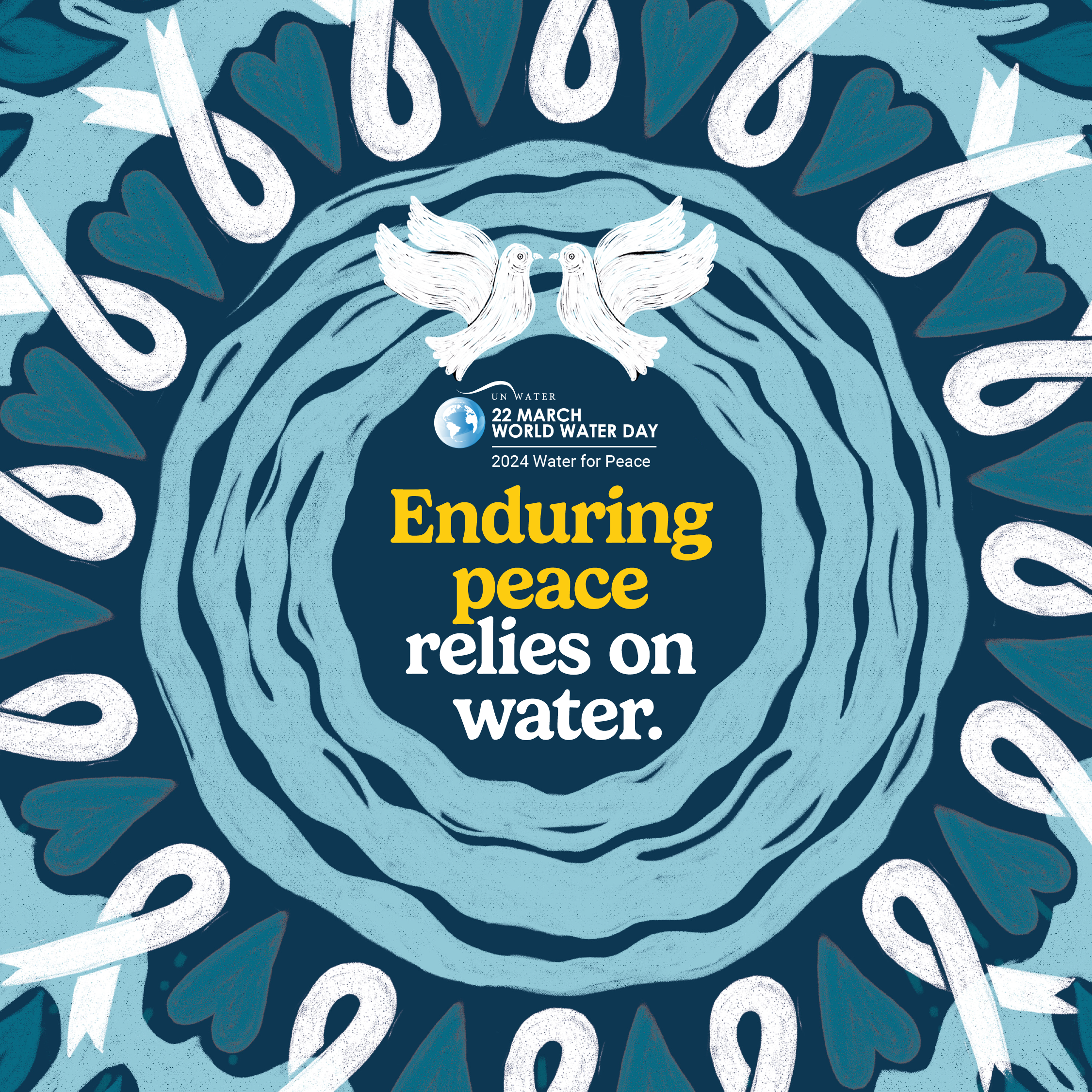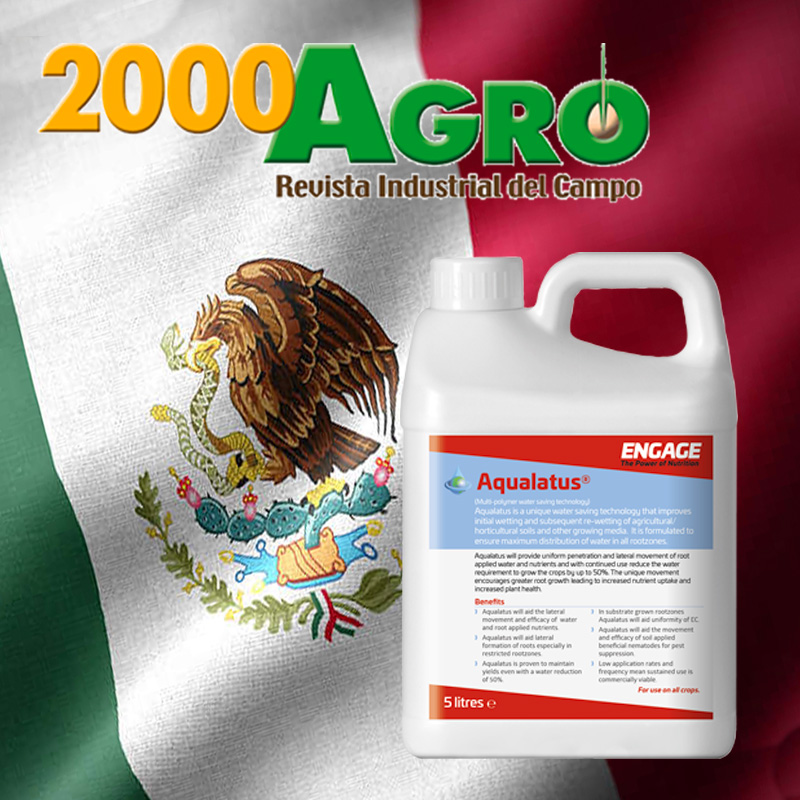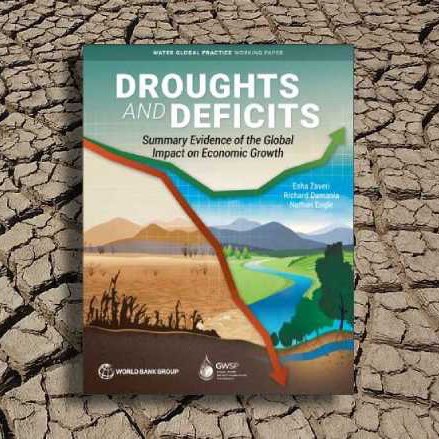
Significant areas of the world are at risk of catastrophic water shortages and more parts of the world are seeing extended periods of water drought leading to a water crisis for global agriculture. Water security is fast becoming one of the largest political issues for many countries and as a result, agriculture will come under more scrutiny is how is manages its water use.
Agricultures uses approximately 70% of the worlds water supply. As demand for arable crops increases year on year due to changing palates, climate change, population density and water wastage, greater pressure is being placed on water availability and quality across the world.
In 2012, Engage saw a necessity for innovation in this sector and began development on a new water saving liquid polymer for use in soils. This technology is Aqualatus.
10 years later, Aqualatus’s advanced liquid soil applied technology is the leading water saving technology for farmers and growers all over the world. Aqualatus is fully proven in over 10 years of independent trials to reduce water loss from evaporation, surface run off and leaching, even in the most arid conditions by over 50% and will lock moisture in the rootzone of crops. It is unsurpassed in initial wetting and long term rewetting of all agricultural soils and substrates and is providing growers and farmers all over the world with water security, and importantly, in doing so, is saving them significant cost in water, fertilisers and energy use.
Below is a map of the world which illistrates just how water stressed many parts of the the world are becoming (information courtesy of the Aquaduct water risk atlas).
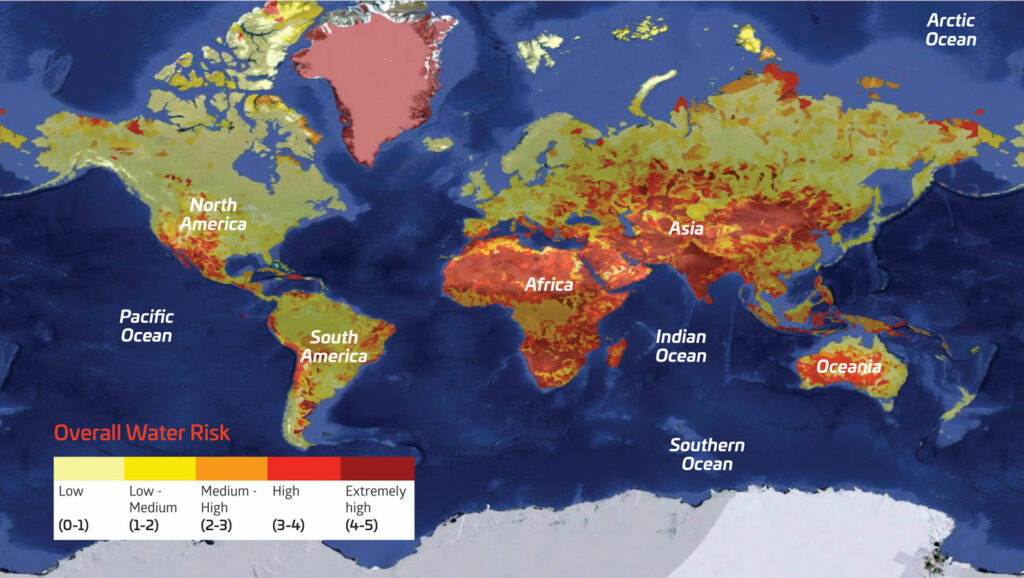
Engage developed the product further in order to create an effective end user product. Aqualatus Ca comes from the Aqualatus/Integrate stable of surfactants but unlike its predecessors it is specifically aimed at rapid coir hydration and expansion, salt leaching and optimisation of nutritional exchange sites through the substrate hydration process.
In the past 10 years of sales and trials Aqualatus has been proven to make it the market leader, so how can it help growers in use and why should they be using it.
50% reduction in water saving
The most important benefit of using Aqualatus is the saving in water.
Engage and its partners across the world have proven that a 50% reduction on water use is possible without any loss in quality of growth of a crop. The reason this is possible is due to the huge reduction in natural water loss Aqualatus brings to the soil when applied via irrigation. Water is lost to the growing crop in three main ways. Surface runoff, surface evaporation and leaching through the soil due to gravity. Aqualatus introduces billions of microscopic structures in irrigation water which naturally adhere to soil particles to increase the moisture holding capacity of the soil by slowing gravitational water movement. Surface runoff and evaporation are almost completely eradicated and gravitational movement is dramatically slowed. Reducing this natural water loss allows for irrigation volumes to be much lower and timings to be shorter as the soil is farmore retentive.
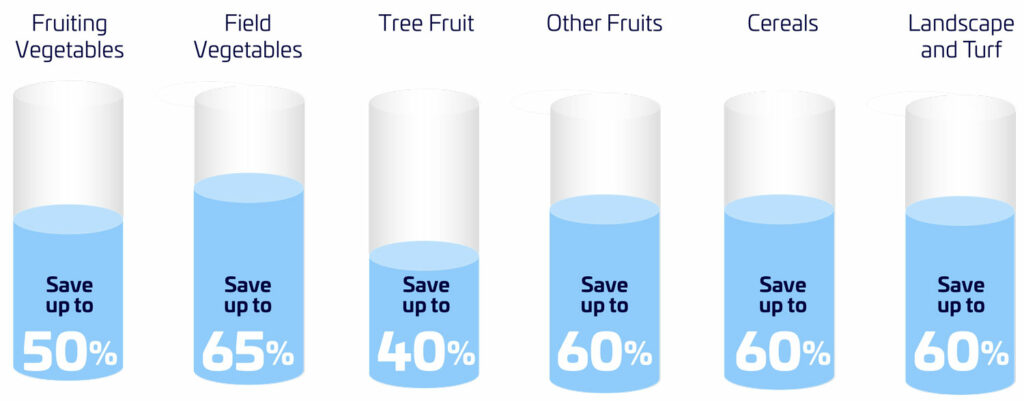
“With regular use of Aqualatus, the slowing of gravitational movement of water, naturally promotes increased lateral water movement.”
Sales of Aqualatus are the highest in areas of the world where arid conditions prevail, due to the necessity for use, so many growers have already adopted its regular use and rely on the benefits Aqualatus brings. One of the most frequent reports Engage see and hear from growers is that once they have used Aqualatus for more than six weeks and they have measured how much water they save in their reduced irrigation practice, they also save fertiliser and energy as both are linked directly to the lower volume of irrigation applied. In light of the dramatically rising cost of fertiliser and energy, the saving on these two important input costs is now a considerable saving.

Increased efficacy of nutrients and soil applied products
With regular use of Aqualatus, the slowing of gravitational movement of water, naturally promotes increased lateral water movement as the microscopic micelles in Aqualatus coat more soil particles. The coating of more soil particles begins to bring uniformity to the soil profile especially across the soil rhizosphere. This allows anything dissolved in the irirgation water such as nutrients, biostimulants, soil conditioners, bio controls, soil sterilants or agrochemicals to be spread more uniformly across the rhizosphere and in doing so, efficacy is increased.
This efficacy has lead to the widespread use of Aqualatus to support the disinfection of soils either through traditional chemical application or in the more progressive ‘solarisation’ disinfection system. The movement and uniform distribution of water optimises efficacy of the two systems to the point whereby its use is seen as essential.
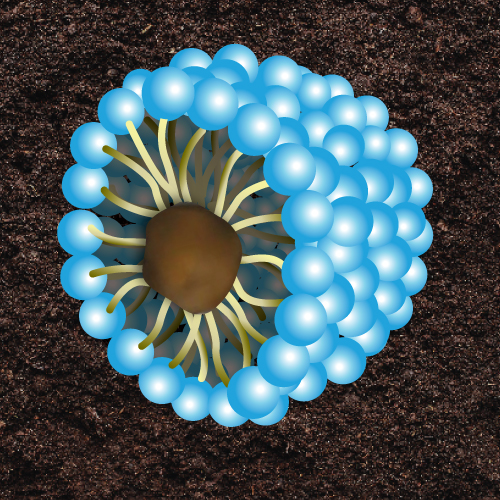
Equilibrium and of air and water
One of the most dramatic changes seen under the regular use of Aqualatus in irrigation water is how it brings balance of air and water the to the soil profile. The micelles within Aqualatus are like tiny, microscopic tadpoles which carry a small electric charge, positive+, in their tails and negative-, in their heads. As can be seen the diagram, (right) the micelles completely surround the soil particles as the tails are attracted to the negatively charged soil particle. What is of great importance is that the tails are hydrophobic, which means they push out water, and soil once the micelles surround the soil particle a tiny pocket of air is created under the globule of water which forms around the soil particle absorbed into the heads of the micelles.
This balance of air and water has dramatic short and long term effects on the soil profile from root activity, soil aggregation and water management.
Soil Aggregation
Under regular use, Aqualatus in irrigation water not only manages the balance of air and water but also its micelles create a web of the polymers, which is very much like a mycelial network, in the soil. This has dramatic positive long term effects on the soil profile which aids a growing crop.
“Under regular use, Aqualatus in irrigation water not only manages the balance of air and water but also its micelles create a web of the polymers, which is very much like a mycelial network, in the soil.”
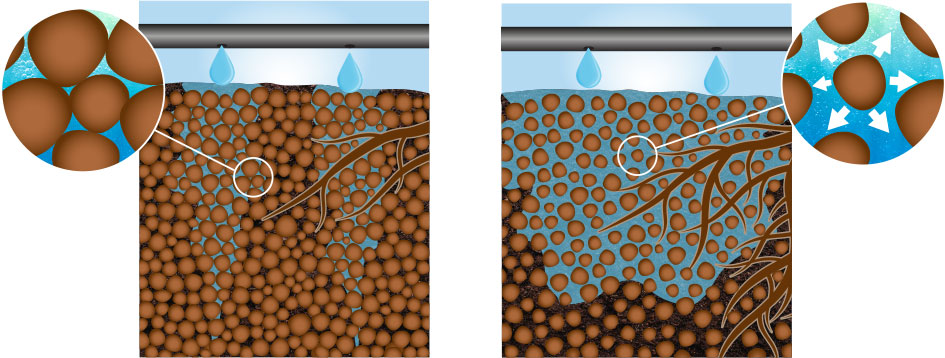
Heavy, compacted soils or soils with a tight structure such as silts or clays open up and become more plasticine in texture which make it easier for crops to grow in and also far easier for growers and farmers to work with. For example, compacted soils in the Cordoba region of Spain, Arizona region of the USA and the Vredendal region of South Africa become as hard a concrete in the summer heat due to their complex soils structures. Under the management of Aqualatus, these difficult soil become more open allowing greater movement of irrigation water and do not cap or harden. The long term effects of Aqualatus in all these regions, farmers stated, land was easier to work and the hard compaction which normally plagues them every season, is no longer an issue.
Conversely the open sandy soils of Southern Spain, North Africa and the Middle East surface evaporation is at its highest and drainage is so fast water cannot be retained. Aqualatus applied via irrigation pulls together the soil particles in the lattice web of the micellular polymers so evaporation of water is greatly reduced as is water drainage. In trials in these kind of soils water loss due evaporation and drainage has been reduced by as much as 60% allowing the soils to be far more productive and remedial applications for organic application and soil conditioning, far more effective.
Water Management
Under the influence of the micelles contained with Aqualatus, the uniformity of water and air across the rhizosphere is between 80-100% and this provides for excellent water management. Waterlogging of soils or anaerobic conditions are impossible to achieve even during flood events to provide continued support for crop growth. In open soils where the Aqualatus creates an equilibrium air and water in the micellular web, optimal moisture levels (55-65%) can be maintained to provide optimal irrigation and nutrient support a growing crop which will produce greater yield and be far more resilient and healthier, resulting in higher quality fruits or produce.
Root Activity
Heavy, compacted soils or soils with a tight structure such as silts or clays open up and become more plasticine in texture which make it easier for crops to grow in and also far easier for growers and farmers to work with. For example, compacted soils in the Cordoba region of Spain, Arizona region of the USA and the Vredendal region of South Africa become as hard a concrete in the summer heat due to their complex soils structures. Under the management of Aqualatus, these difficult soil become more open allowing greater movement of irrigation water and do not cap or harden. The long term effects of Aqualatus in all these regions, farmers stated, land was easier to work and the hard compaction which normally plagues them every season, is no longer an issue.
Conversely the open sandy soils of Southern Spain, North Africa and the Middle East surface evaporation is at its highest and drainage is so fast water cannot be retained. Aqualatus applied via irrigation pulls together the soil particles in the lattice web of the micellular polymers so evaporation of water is greatly reduced as is water drainage. In trials in these kind of soils water loss due evaporation and drainage has been reduced by as much as 60% allowing the soils to be far more productive and remedial applications for organic application and soil conditioning, far more effective.

Within a month of starting using Aqualatus the water/air equilibrium is achieved and this effects plant roots very quickly. The lateral roots which access water and nutrients find it far easier to grow and work and the increased lateral movement of water, nutrients and support compounds added via irrigation, means they are uniformly placed across an extended area. This stimulates roots to growth more uniformly through the soil profile across this larger area.
As an example, during a citrus trial at Twaktuin Fruit Farm, Clanwilliam, South Africa roots on a two year old orange bush where measured to a growing area of 5m³ compared to the control which had a rootzone of just 1.5m³.
The retention of moisture is a long term effect and has been known to be a major reason Aqualatus is successful in many parts of the world where energy is an issue and irrigation application may be interrupted for many days. Aqualatus’s water retention potential allows crops extend their root reach to greater levels of moisture to maintain optimal growth for far longer even if irrigation water is not reinforced for several days.
Business Case
So, the next question we need to know is does it stand up in cost in use?
Aqualatus will cost an average, depending upon rate of application and crop, between £240-£320 per growing season where 6-8 monthly applications are used. From data provided in independent trials and commercial use Aqualatus will save in cost of water, nutrients and energy 15 to 20 times the cost of application. Aqualatus is easy to apply as it is inert and can be mixed into any irrigation system without issue.
Engage have also made sure Aqualatus is safe in use both over and under the growing crop. The polymers used to make Aqualatus are safe to use over any growing crop where overhead irrigation is used and are completely biodegradable in 6-8 weeks. Eighty percent becomes oxygen and CO² and the other twenty becomes food for soil bacteria. These means the technology has zero environmental fate allowing its use in all types of crop production.
As the pressure on water, fertiliser and energy costs increases, technologies such as Aqualatus, once seen as only viable in high value crops are now becoming essential tools to maintain water security, crop quality and financial return.
The question of whether growers can afford to use a technology such as Aqualatus is fast being replaced by ‘can’ growers afford not to!
Contact Engage…
For more information about our products or interested in learning more about our services?



